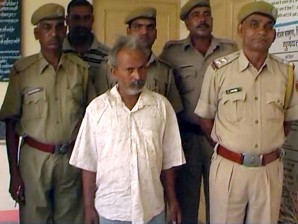Indian man unrepentant after beheading daughter

In this image made off video footage filmed on Monday, June 18, 2012, Indian marble miner Oghad Singh, center, stands with policemen after they placed Singh in custody in Charbhuja, Rajasthan state, India. Police said Singh remains unrepentant after beheading his daughter with a ceremonial sword in a rage over her alleged relationships with men. AP
JAIPUR, India — A father in northwestern India remained unrepentant after beheading his daughter with a ceremonial sword in a rage over her relationships with men, police said.
The man surrendered at a police station, carrying the head in one hand and the bloodied sword in the other, police said Tuesday. Oghad Singh, 46, was charged with murder.
Residents of Dungarji village expressed shock as they performed the last rites for the 20-year-old woman, who was killed Monday.
Police said Singh, a marble miner, accused his daughter of bringing dishonor to the family and making it hard to find husbands for her two unmarried sisters.
Women wailing in grief lined the dusty road of the village in Rajasthan state as a procession carried Manju Kanwar’s remains to her funeral pyre. As in many north and west Indian villages, the women, including her mother and four sisters, were not allowed to attend the funeral.
Article continues after this advertisementRapidly modernizing India faces increasing social clashes as youths resist traditions like arranged marriage or limits on women venturing outside their parents’ or husbands’ homes, especially in conservative rural areas. Some of these conflicts have led to women or young couples being lynched by village kangaroo courts. But such a brutal punishment by a father is relatively rare in a country of 1.2 billion people.
Article continues after this advertisementDungarji residents condemned Singh’s actions as extreme. They said that Singh, his shirt soaked in blood, had carried his daughter’s head through the village, describing what he’d done to neighbors.
A coroner stitched Kanwar’s head onto her body for the funeral. About 100 men, many of them relatives wearing ceremonial Rajput warrior clan turbans, surrounded her muslin-wrapped body, and her brother lit the funeral pyre.
“He told me that he took the sword out, and when the daughter was all alone in the house he beheaded her with a single stroke and the head fell on the ground,” said Narayan Singh, a distant relative.
He said he persuaded Singh to surrender, and took him by motorcycle to a police station 5 kilometers (2 miles) away.
“It was a ghastly sight,” officer Ranjit Singh said, describing the father sitting in the station’s waiting room holding the head in one hand and the sword in the other. “Oghad admitted immediately that he killed his daughter because she had earned a bad name for the family.”
Police described Kanwar’s recent life as difficult and unorthodox for the traditional community of about 1,000 just outside the Rajasthani tourist town of Udaipur.
She left her husband from an arranged marriage two years ago and moved back home to live with her parents. She recently began seeing several men which “disgusted” her father, deputy police superintendent Umesh Ojha said.
“Oghad said he was fed up with the lifestyle of his daughter,” Ojha said.
When Manju eloped with one man two weeks ago, her father forced her to return on Sunday and killed her.
India is considered one of the harshest places in the world for women, with female infanticide and child marriage still common.
The U.N.’s gender inequality index places India second to last, above Saudi Arabia, based on labor, reproductive health, education and politics. The index does not consider issues of violence.